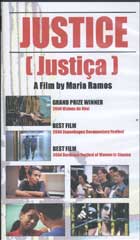
Justiça (Justice) 2004
Distributed by First Run/Icarus Films, 32 Court St., 21st Floor, Brooklyn, NY 11201; 800-876-1710
Produced by Niek Koppen, Jan de Ruiter, Renee van der Grinten; Selfmade Films in co-production with NPS
Directed by Maria Ramos
VHS, color, 102 min., in Portuguese with English subtitles
College - Adult
Criminal Justice, Latin American Studies, Human Rights, South American Studies
Date Entered: 12/21/2005
Reviewed by Maureen Puffer-Rothenberg, Valdosta State University, Valdosta, GAJustiça goes inside the justice system in Rio de Janeiro, Brazil, documenting defendants’ encounters with judges, witness testimony, life in an overcrowded detention center, and a public attorney’s futile efforts to defend her clients. Filmmaker Maria Ramos filmed five defendants but focuses on Carlos, who drove a stolen car into a tree, and eighteen-year-old Alan, suspected of dealing drugs. Ramos offers glimpses into the professional and personal lives of the judges and the public defender, and takes viewers into the overcrowded, dirty and dilapidated detention center where defendants await sentencing.
Carlos says he borrowed the stolen car from a friend but later admits he knew it was stolen. Carlos has been arrested often and prosecuted at least five times; in light of his past record he is eventually sentenced to three years. Alan claims he was merely flying a kite in the street when he was arrested; the judge says drug dealers fly kites as a signal that police are coming. Alan has never been arrested before and will be released, but in poor physical condition after becoming ill in jail.
In each case the defendant tells his side of the story directly to a judge. The judge hears witnesses’ testimony, the attorneys for each side submit reports, then the judge decides if the defendant is guilty and passes sentence. Inês, the public defender, is generally silent. The judges are polite but skeptical and indifferent to defendants’ pleas regarding poor jailhouse conditions and police misconduct (most defendants claim they have been beaten by the police). Carlos and his mother tell Inês the police have accepted bribes in the past to release him. Inês points out that nearly all defendants are found guilty; in her opinion prosecutors and judges think they are “saving society” by condemning “small fry.”
Justiça contrasts the home lives of the middle-class judges and lawyers presiding over the courts and those of the lower classes whose fates are decided there. Inês discusses flaws in the court system over a three-course dinner with her family and judge Geraldo also enjoys a spirited family dinner in his comfortable home; Carlos’ wife prepares supper for her toddler daughter and sits in silence as the child alone eats in their shared bedroom. Judge Fatima is shown being rather petty about her promotion to the High Court; in a poignant (though overlong) sequence Carlos’ mother attends a Pentecostal church service and prays for a promised “glorious” change in her own life.
To her family Inês expresses her overall view of the justice system and her role in it, but the prosecutor never speaks on camera. Judge Geraldo offers a bit of philosophy in front of a criminal justice class, but neither he nor the other judges are asked what they feel they accomplish in the lower courts. Justiça makes its points without narration or interviews, leaving the viewer to sort out the moral ambiguity between the judges, defendants and public defender.
The film’s pacing is slow; there are many scenes in which the purpose is unclear as people walk down long hallways, drive silently, ride the bus, write at their desks, and enter or leave buildings. There is some heavy-handed symbolism (an illustration of Jesus behind bars in the detention center, a judge driving past a crime scene) and occasionally cuts between scenes are sudden and confusing. While Ramos’ documentation of Rio de Janeiro’s lower court system is certainly valuable, the film is a bit long for the information conveyed.
Justiça is recommended for mature students interested in the Brazilian criminal justice system or involved in cross-cultural studies of criminal justice.
Awards
- Grand Prize, Taiwan International Documentary Film Festival
- Amnesty Award, Copenhagen International Documentary Festival
- Grand Prix, International Documentary Film Festival Visions du Réel
- Best Director, Santiago Festival Internacional de Cine
- la Vague d'Or, Bordeaux International Festival of Women in Cinema
- Best Film, Atlantic Category, Play-Doc International Documentary Festival
- Special Mention of the Jury, Lisbon International Documentary Film Festival